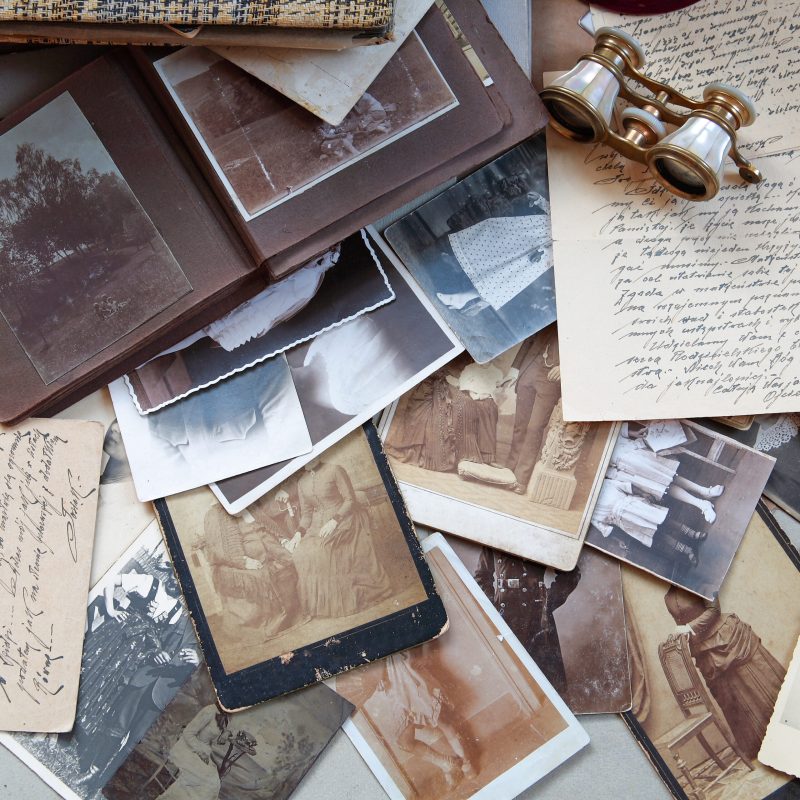
People obsessed with ancestry reel off names and dates until their friends’ eyes glaze over. But the best stories — the heart and soul of history — are found not on a computer but through travel.
Videos by TravelAwaits
My research took me to Stourbridge, England, and the ancestry lessons I learned are applicable to all, whether your family comes from Galway, China, or Timbuktu.

Nadine Cresswell-Myatt
1. Contact Local History Societies
When I first arrived in Stourbridge, I couldn’t imagine my mother’s era: the 1920s to ’50s, when she peddled an old bicycle down country lanes humming “In the Mood” or “Little Brown Jug.” But slowly the past emerged despite the busy ring roads and dense housing estates.
I knew she absconded from the area in the 1950s. She was 35 and pregnant with me when she eloped, leaving her history and a previous marriage behind.
The local history society wound up doing most of my research. They receive lots of queries from overseas and seem delighted to help. In Stourbridge, history is a local pastime.
During one visit, my helper passed on local knowledge. “A hay cutter!” she tutted, noting my great grandfather’s occupation on the census. “That’s seasonal work. He was basically unemployed!”

Nadine Cresswell-Myatt
2. Tap On Doors
Armed with addresses, I knocked on doors. Sometimes I knocked on the wrong door and was still asked in. It’s not every day an Aussie comes calling, and the popularity of shows like the BBC’s Who Do You Think You Are? means people love helping.
Eventually, I was shown into a house where my mother once lived, and the owners even gave me a few minutes alone to dwell on the past and let my emotions settle.

Nadine Cresswell-Myatt
3. Visit Sites (Even When They Have Changed)
Some of the sites I visited were unsettling. My mother’s mother was unmarried and had four children out of wedlock. The first two she raised, but when she was seduced or worse while working as a maid, she became pregnant with twins. It was the Depression, she came from a poor family, and she ended up in the workhouse slogging away in the laundry.
By the time I got to Stourbridge his old workhouse had been redeveloped into a housing estate. But the Brits value the past, and developers kept the laundry furnace chimney and the original clock tower that chimed the girls’ long working days.
My mother was sent to an orphanage. She’d scrawled an account of her first memory in an exercise book which I found after her death:
The sobbing was uncontrollable, and I vividly remember being assuaged by a tempting crust of bread, and butter smothered in golden syrup. The bread looked as thick as the doorstep on which I sat — that was my earliest memory. It was taken for granted by me that we were placed in the homes because our mother being unmarried could not afford to keep us…
Locals told me the orphanage had been demolished, and like any place with acreage, turned into a housing estate.

Nadine Cresswell-Myatt
But I found the houses built around an old playing field. My mother wrote of how she would stand at a window and longingly watch her twin brother Frank kicking a ball. The sexes were strictly segregated, so she was unable to talk to him for 12 years.
Instinct drew me to a path behind some bushes. There was the old receiving house and the doorstop where she sobbed. I sat on that blockbuster of a doorstep and cried. She had been ripped from her mother, just as I now had lost her.
The door to the derelict building mysteriously swung open revealing long, soulless halls, scuffed linoleum, and barred windows. Even though trespassing, I walked in to find a frame with photos of some of the orphans and their cottage parents.

Nadine Cresswell-Myatt
Pinned in the center was a note: If anyone would like information on what it was like at the cottage homes, please contact Terence, who was an orphan here in the 1930s.
When phoned, Terence he said he’d placed that note there 18 years previously when he first retired. He was astounded that someone had finally contacted him — especially someone from overseas.

Nadine Cresswell-Myatt
4. Search For Contemporaries
I drove Terence to the site. He asked me to take his photo in front of the downpipe, which had been his cricket stump. “No toys,” he said. “Instead, we had hours of fun with a piece of string forming shapes between our fingers.”
He pointed to the empty bookshelves. “There were books, but we were not allowed to read them — they were for show. And school wouldn’t give us homework because ‘homers’ weren’t expected to get on in the world.”
His depictions of orphanage life explained much about my mother, who despite being a great beauty had extremely low self-esteem.

Nadine Cresswell-Myatt
5. Hang Out With Locals
I walked down a street ironically called Hope Street looking for the house my grandmother worked in as a maid.
There was no house significant enough to have warranted servants. I asked a local walking his dog if he knew one. “If you want to know anything around here, Love, you have to ask in the pubs.”
So began my fortnight of drinking endless pots of cloudy cider and spilling my mother’s story to barmaids. My mother had worked as a barmaid, and these women felt an affinity with her story. They introduced me to old-timers on the off chance they might know something.
The Glasscutters Arms had a bowling club behind it, and one of the old men there excitedly told me he had known my mother’s first husband, Bill Hopton, a glassblower.
“He died on the green,” he said. “Had a heart attack. But he lived with his sister, and she had a son, and he was like a grandson to him. He drinks at the Cat.”
Tracking him down, he opened the door to me in his moccasins and skinny jeans. It was the only doorknock where I wasn’t invited in. The past was the past, and he didn’t want to know about it.

Nadine Cresswell-Myatt
6. Try All Doors
There was a warmer welcome at the manor house where my mother’s older sister and aunt had lived in as servants. The eccentric owner had built a cinema in his attic.
The manor house was still in the family, and I had written a letter to the present owner. I was almost heading home when I received the email. Would you like to come to supper?
We dined at a table on expansive lawns. Dessert was a meringue loaded with blackberries picked from the garden.
As I sipped champagne, I thought of my ancestors who were once his family’s servants, and of how gobsmacked they would have been to see me hobnobbing with the aristocracy.
After dinner came the grand tour. There was a coat of arms over the door, family portraits in each room, and an impressive main staircase so rickety we were forced to use the servant’s staircase — quite fitting given my family’s background.
Three flights took us to the attic where there was a now run-down art deco cinema and a ticket booth where my 16-year-old mother sold tickets after leaving the orphanage.

Nadine Cresswell-Myatt
7. Heed The Lessons Well
On my trip to the Black Country, I did not find any relatives. Yet, I did find out much more about my mother. Her orphanage background set her on a course for life. When she became pregnant with me, there was no way she was going to suffer the indignities of having a “bastard” child.
She changed her name by deed poll and ran away with my father. They boarded a cargo ship for a new life in Australia, marrying some seven years later.

Nadine Cresswell-Myatt
8. Go Before It’s Too Late
My trip made me realize the importance of visiting the lands of our forebears before more evidence is lost.
That was three years ago. Since then the manor, after being in the same family for generations, has been sold and turned into apartments, and perhaps a house has already supplanted the old receiving house.

Nadine Cresswell-Myatt
9. You Can Address Past Hurts
My mother loved words, but with a meager education, she could only find kitchen jobs after my father left her. So, like her mother, she struggled to raise children on her own.
In her 80s, before dementia set in, she wrote down her memories, perhaps knowing one day I would follow the clues.
One of the local history ladies I befriended in Stourbridge suggested I send my mother’s reminiscences to a history journal, The Blackcountryman.
To my delight, the editor thought my mother’s story well-written enough to publish.
It seems strange that my mother’s homecoming should be in print, and that the daughter she left her birthplace for, in order to shield her from gossip and innuendo, paved the way for her return.
So, yes, “the past is a foreign country,” but it’s a place you can certainly travel to.
